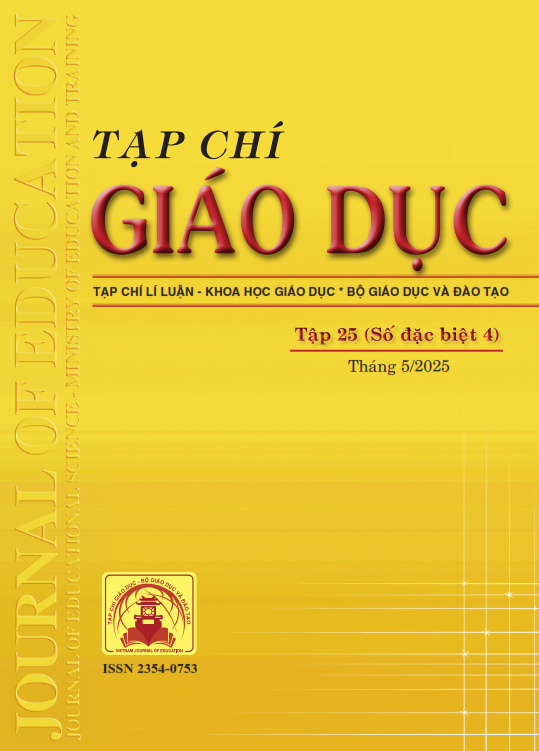Mức độ tư duy nhóm và kết quả học tập của sinh viên: Nghiên cứu Trường hợp tại Trường Đại học Vinh
Tóm tắt
In the field of cooperation, teamwork is an important factor for success in learning and working. The ability to work effectively in a team is often affected by different factors, including groupthink. This research aimed to investigate the levels of groupthink among students and its impact on academic performance at Vinh University. The study involved 251 students who participated in a survey conducted via the Google Forms app, and 20 students were interviewed in a follow-up stage. The results indicated a moderate level of groupthink among Vinh University students, with groupthink having a moderate negative impact on academic performance. Specifically, the findings revealed that as the level of groupthink increased, students’ performance tended to decrease. Based on these findings, several pedagogical recommendations were proposed to mitigate the negative influence of groupthink on students’ academic performance.
Tài liệu tham khảo
Balamurugan, A. (2019). Effect of teamwork on the work performance of employees in the IT sector. International Journal of Advanced Research, 7(10), 1283-1287. https://doi.org/10.21474/ijar01/9956
Choi, J. N., & Kim, M. U. (1999). The organizational application of groupthink and its limitations in organizations. Journal of Applied Psychology, 84(2), 297-306. https://doi.org/10.1037/0021-9010.84.2.297
Esser, J. K. (1998). Alive and well after 25 years: A review of groupthink research. Organizational Behavior and Human Decision Processes, 73(2-3), 116-141. https://doi.org/10.1006/obhd.1998.2758
Janis, I. L. (1971). Groupthink. Psychology Today, 5(6), 43-46, 74-76.
Janis, I. L. (1972). Victims of groupthink: A psychological study of foreign-policy decisions and fiascoes. Houghton Mifflin.
Kerr, N. L., & Tindale, R. S. (2004). Group performance and decision making. Annual Review of Psychology, 55, 623-655. https://doi.org/10.1146/annurev.psych.55.090902.142009
Khawam, A. M., DiDona, T., & Brenda. (2017). Effectiveness of teamwork in the workplace. International Journal of Sciences: Basic and Applied Research, 32(3), 267-286.
Leana, C. R. (1985). A partial test of Janis’ groupthink model: Effects of group cohesiveness and leader behavior on defective decision making. Journal of Management, 11(1), 5-17. https://doi.org/10.1177/014920638501100102
Longley, J., & Pruitt, D. G. (1980). Groupthink: A critique of Janis’ theory. In L. Wheeler (Ed.), Review of personality and social psychology (pp. 74-93). Sage.
McAvoy, J., & Butler, T. (2009). The role of project management in ineffective decision making within agile software development projects. European Journal of Information Systems, 18, 372-383.
Nemeth, C. J., Personnaz, B., Personnaz, M., & Goncalo, J. A. (2004). The liberating role of conflict in group creativity: A study in two countries. European Journal of Social Psychology, 34(4), 365-374. https://doi.org/10.1002/ejsp.210
Packer, D. J. (2009). Avoiding groupthink: Whereas weakly identified members remain silent, strongly identified members dissent about collective problems. Psychological Science, 20(5), 546-548.
Riccobono, F., Bruccoleri, M., & Größler, A. (2016). Groupthink and project performance: The influence of personal traits and interpersonal ties. Production and Operations Management, 25(4), 609-629.
Sniezek, J. A. (1992). Groups under uncertainty: An examination of confidence in group decision making. Organizational Behavior and Human Decision Processes, 53(1), 85-97.
Su, Y. (2022). The influence of groupthink on the values of middle school students. Atlantis Press, 684, 384-394.
Turner, M. E., & Pratkanis, A. R. (1998). Twenty-five years of groupthink theory and research: Lessons from the evaluation of a theory. Organizational Behavior and Human Decision Processes, 73(2/3), 105-115.
Wang, Z., Li, C., Wu, J., & Liu, L. (2014). The mediating effect of cooperative goals on the relationship between team orientation and team member exchange. Social Behavior and Personality, 42, 685-694.
Wong, Y. Y., Chow, I. H. S., Lau, V. P., & Gong, Y. (2018). Benefits of team participative decision making and its potential to affect individual creativity. Journal of Applied Social Psychology, 48, 369-376.
Đã Xuất bản
Cách trích dẫn
Số
Chuyên mục
Giấy phép

Tác phẩm này được cấp phép theo Ghi nhận tác giả của Creative Commons Giấy phép quốc tế 4.0 .












